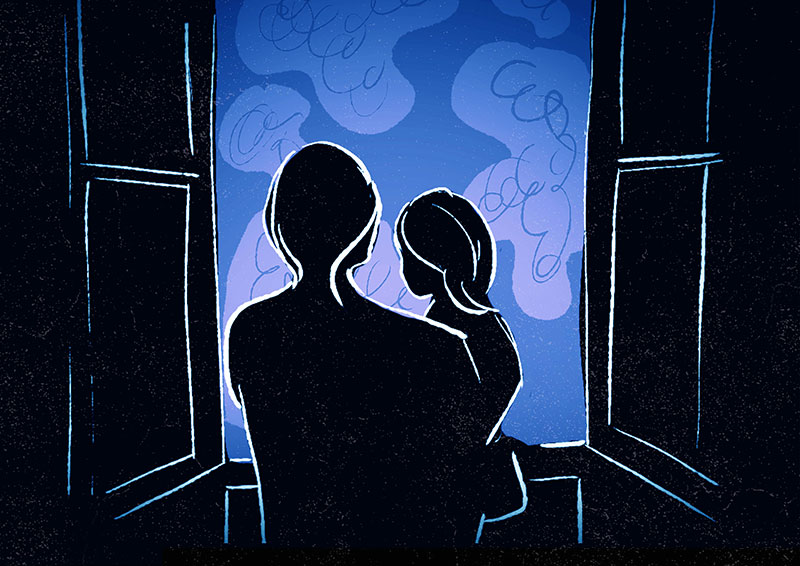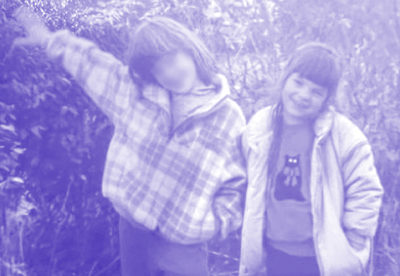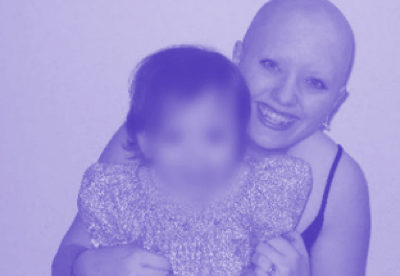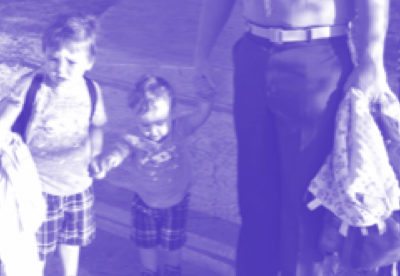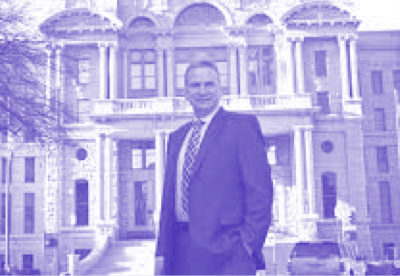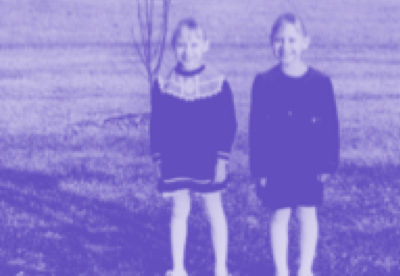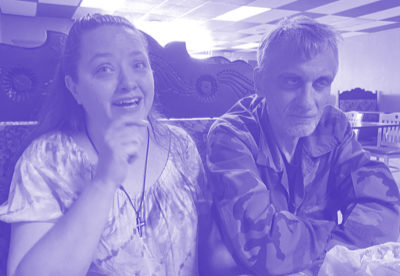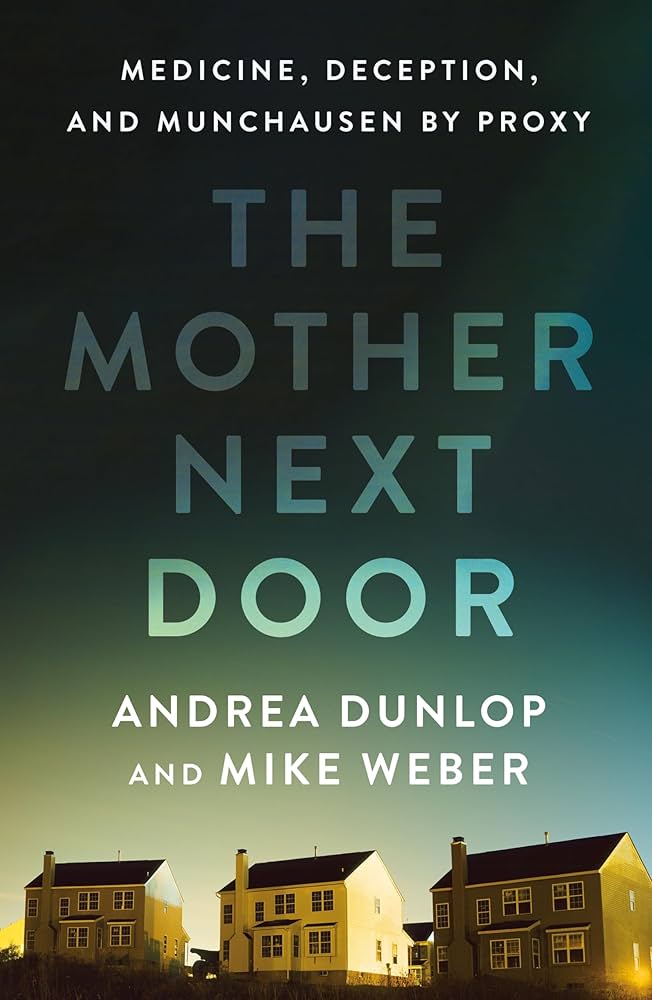SEASON 04 | EPISODE 03
Host Andrea Dunlop:
https://www.andreadunlop.net
For behind-the-scenes photos:
https://www.instagram.com/andreadunlop/
Support the show and get exclusive bonus content:
https://patreon.com/NobodyShouldBelieveMe
For information and resources:
https://www.munchausensupport.com
The American Professional Society on the Abuse of Children’s MBP Practice Guidelines can be downloaded here.
More about Dr. Marc Feldman:
https://munchausen.com
Transcript
[00:00:00] Andrea: Just a heads up that there are mentions of child sexual abuse in this episode, so please take care. Those of you who are long time listeners of this show will know that I started my work with Munchausen by Proxy because of a novel that I wrote. That was based on my family experience, and that when I wrote that novel, [00:00:20] I was pregnant with my first child.
[00:00:22] Andrea: My daughter Fiona. Becoming a mom put the specter of this abuse in a stark new light for me. Being a new mom brought me a lot of joy, but it also brought this crushing anxiety that something could happen to this tiny, fragile being who was suddenly in my life. [00:00:40] And I know this is not specific to my experience.
[00:00:46] Andrea: You become a parent and overnight you have this sudden, horrible new worst case scenario. That something could happen to your baby. That you’re not going to be able to protect them from everything. And the thought of making my daughter [00:01:00] sick on purpose, which is what I believe my sister has done to her own children.
[00:01:05] Andrea: Unfathomable, just unthinkable. doesn’t begin to describe it. And all of this just made me come face to face with how dark the series of events in my family really was. [00:01:20] Because I had to look at it, and I really understood for the first time, on a visceral level, how far gone a person would have to be to do something.
[00:01:31] Andrea: Like, how absent that maternal instinct, or honestly, any real capacity for empathy. would have to be in order to [00:01:40] harm your own child in such a premeditated way. And now I say maternal instinct because according to the data 96 percent of known perpetrators of Munchausen by proxy are mothers. Even with all the stress, I really love being a mom, and I’ve loved watching my husband become a dad.[00:02:00]
[00:02:00] Andrea: My kids are really lucky, he’s a really good one. So, this brings me to the other side of the question. How could any father let this happen to his child? So the fathers in these cases, as I’ve learned, really run the gamut. On the one hand, you have dads like the ones that we talked to in [00:02:20] season one. People like George Honeycutt and Ryan Crawford.
[00:02:23] Andrea: Dads who just went to the ends of the earth to protect their kids from their abusers. And on the other side of the coin, you have dads like Lou Pelletier and Jack Kowalski, who not only didn’t intervene when this abuse was happening in their own house, but who waged opportunistic [00:02:40] lawsuits against the people who did.
[00:02:42] Andrea: And of course, many more are somewhere in between. Their relationship with the mother of the child is either non existent or tumultuous, and it’s And that leaves them unable or unwilling for whatever set of reasons to get involved at all. Now, like everything about Jo’s story, the stuff with their dad, [00:03:00] it’s complicated.
[00:03:07] Andrea: Tumultuous relationships are the only kind that Jo and Crystal’s mom had. And that went for the man she was married to when Jo was born, Crystal’s stepfather Dale. This came up as Crystal and Jo were reflecting on their memories [00:03:20] of their parents.
[00:03:23] Crystal: Yes. They got married in I don’t even know, like 92 maybe?
[00:03:30] Crystal: Maybe 90. It was like pretty, pretty early 90s. I just remember it was a peach dress. I hated that thing. Yeah. [00:03:40] Was that here? Were you in the wedding? I was in the wedding. Wait,
[00:03:42] Jo: how many weddings were you in? Was that, I guess I’d have been the only one. Were you too young for the only one I was in. She’s been married four times?
[00:03:51] Crystal: Um, she was married at 17. Mm
[00:03:53] Jo: hmm.
[00:03:54] Crystal: That guy, I think he died in a car accident. Mm hmm. And then she was in the
[00:03:59] Jo: car, I think, right? [00:04:00]
[00:04:01] Crystal: Yeah, she was. And that’s when like she had like shattered bones and stuff and then she was never married to my bio dad. Then she married Cliff Dale, and then she’s been engaged multiple times to like Dan, Mike.
[00:04:15] Andrea: There were a lot of men coming in and out of Joe and Crystal’s life. Dale was the most [00:04:20] consistent, or around the longest at least, but he wasn’t exactly what you would describe as present.
[00:04:26] Jo: My dad was a truck driver, so he would be gone for like months at a time. He just wasn’t really in the house very much, and even in my records, like if my dad was at the hospital he would be [00:04:40] explained as sitting in the corner, not offering up any information, not talking, just very quiet.
[00:04:47] Jo: And my mom, they would say, would be like hovering over me, or swaddling me, or holding me in the bed with me, all these things. So he just was a very, Seemingly passive person, very quiet guy [00:05:00] who just wasn’t there much.
[00:05:01] Andrea: This dynamic of the intense, overbearing mother and the passive father is noted as the most common one in the literature about Munchausen by proxy cases.
[00:05:10] Andrea: When Jo was very young, things took an extremely dark turn with Dale.
[00:05:14] Jo: And then when I was four, My mom told the [00:05:20] cops that he sexually assaulted me. I also told the cops that I do have the police records and I have records from like the hospital statements and things like that where I made statements saying the exact same story that my mom said.
[00:05:37] Jo: And I mean, honestly, to this [00:05:40] day, to me it’s kind of 50 50. The stuff that my dad told the cops makes me question it even more. I wouldn’t think that he had anything to do with it, but just some of the things he said were questionable and kind of concerning and make it seem like maybe something happened, [00:06:00] but it’s kind of, it’s Very up in the air.
[00:06:02] Jo: I don’t have any vivid memories or any real memories of any of it.
[00:06:06] Andrea: Because of both Joe’s age when these events took place and the effects of the trauma on their memories from this time, Joe just can’t be sure what really happened.
[00:06:14] Jo: So then he went to jail. Eventually the [00:06:20] charges were all dropped. My mom claimed that it was all a misunderstanding and that it was actually somebody at daycare.
[00:06:29] Jo: that had sexually assaulted me. And so all the charges were dropped. Um, during that time, like I was forced to do therapy, which [00:06:40] I really needed therapy for a lot of reasons, but all of the, I only went a couple of times in the therapy notes. Were that my mom did the sessions and it was just my mom talking about her trauma and herself and things going on in her life the entire time while I just kind of [00:07:00] sat on the side or sometimes wasn’t even in the room.
[00:07:02] Jo: Can I ask what, what are, like, what
[00:07:07] Andrea: was it that your father said that made you want to Oh, maybe actually there was something strange going on here. Cause I can see why the immediate looking back, the immediate assumption would [00:07:20] be that this was a false accusation, right? Not something those people would do, but definitely someone like your mom would do.
[00:07:26] Andrea: Um, so what, what was it that made you sort of question?
[00:07:31] Jo: So, like, I don’t think necessarily that exactly what I told the cops is what happened. I think that some of the stuff that I told the cops with, [00:07:40] like, exactly what he did was, like, dramatized, but when he talked to the cops and, like, gave his
[00:07:48] Andrea: statement Joe recounted this situation to me and noted that the details Dale offered were eerily reminiscent of another time that they’d been sexually assaulted as a child by one of their [00:08:00] landlords.
[00:08:00] Andrea: What is certain is that there was sexual abuse happening to Jo when they were a child. And far from protecting them from it, Jo suspects Donna may even have been involved.
[00:08:12] Jo: There was for sure some sort of sexual abuse happening. I mean, in my records, my medical records, there’ll be like times that there [00:08:20] was bleeding, or swelling, or redness, or things like that.
[00:08:24] Jo: And so, I really do think more of that was probably my mom. Um, And, like, a way to use that for different things, but I did have a lot of chronic, like, UTIs, and I wet the bed until I was probably, [00:08:40] like, six or seven. Um, so there are a lot of signs that there was something going on, but I, yeah, I don’t know that I’ll ever know.
[00:08:49] Andrea: Because of the records that Jo has been able to obtain, they know the broad outlines of what happened to them, but so much else remains a mystery. And the search for clarity from Dale has been a frustrating one. [00:09:00]
[00:09:00] Jo: I know I’ve gone back and forth where when I first started kind of trying to come to terms with everything, I would like text my dad and I’d be like, I know what you did.
[00:09:09] Jo: And I’m like, I’m not mad. I just want you to like own up to it and be like honest. And, you know, he would always be like, I didn’t do anything. And I would, I did the same to my mom when I found out [00:09:20] about the MVP, where I would be like, I’m not mad. Like, but I know that this happened. Like, let’s just have a conversation.
[00:09:26] Jo: And obviously just abusers, perpetrators aren’t going to own up to what they did. And it’s always the same stories of, it was an accident or we were special friends, or I would never [00:09:40] hurt you, or just. This person did this or whatever, there’s always some sort of excuse and avoidance.
[00:09:48] Andrea: So their charges were eventually dropped and then at that point I’m assuming they split up?
[00:09:55] Jo: Yeah, so that’s when they split and then my mom started dating other people and then that’s when [00:10:00] we moved not long after and um, like I said, then my dad came back in my life at some point and there was like visitation. And it’s kind of It’s all kind of blurry how it all happened, um, and then he found out I wasn’t his kid and then he was back out again for a while.[00:10:20]
[00:10:23] Andrea: When did you learn that the man you’d been told was your father was not in fact your biological father?
[00:10:33] Jo: So I found out when I was 11. He found out [00:10:40] When I was seven. So until I was seven years old, he was under the impression that I was white and that I was his child. He’s on my birth certificate and people, I guess around him had told him there was no way just based off of the color of my skin.
[00:10:58] Jo: But he refused [00:11:00] to believe it, I guess, and really just held on to this belief that he was in fact my dad when I was seven. He did a, like a swab test on me. I remember the people that were standing around me. Like, I remember that so vividly because I was so confused and nobody would tell me what was happening, but I’m [00:11:20] pretty sure I wasn’t like supposed to tell my mom.
[00:11:22] Jo: It was like the secret thing that we were doing. And then all of a sudden my dad was gone. And I, like, didn’t know for so long what had happened. My mom, of course, told me that it’s because he hated me and didn’t like me and wanted nothing to do with me and all these [00:11:40] things, um, which made me closer to her and made me really not like him.
[00:11:45] Jo: Um, so then once he got visitation rights and stuff like that, I didn’t want to spend much time with him.
[00:11:53] Andrea: Dale’s disappearance reinforced Donna’s narrative that Joe couldn’t trust or depend on anyone but [00:12:00] her. But all Joe knew was that Dale disappeared, and they didn’t have any understanding of why until several years later.
[00:12:07] Jo: When I was 11, I was at a, my first middle school dance, and I, out of the dance and there was my mom and there was this guy [00:12:20] in the passenger seat. And I, I had seen this guy before. My mom and I would often walk to the grocery store and he would always be parked on the side of the road and he’d get out and he’d come talk to us.
[00:12:31] Jo: And I thought it was just some friend of my mom’s or something. So we would talk and whatever. Sometimes I’d see him driving around the block, but I don’t know. [00:12:40] I didn’t really think much of it. And I got in the car and my mom was like, this is your biological father and I was like, that’s a lot of information for my like 11 year old brain to try to like understand so That, uh, definitely [00:13:00] ruined my first middle school dance experience.
[00:13:03] Jo: And when we got home, I, it’s kind of weird. So he’s Iranian, Iranian American. And he, he taught me how to count to a hundred in Spanish. That’s what we spent our entire night doing. No idea why I, it’s not, that’s [00:13:20] not the language that you speak in Iran. So I’m not really, I still can. Count to a hundred in Spanish.
[00:13:25] Jo: It really stuck. We spent a lot of time on it. I remember the whole night just wanting to go to bed. I had no idea what was happening.
[00:13:33] Andrea: Donna sprang Reza, Joe’s biological father, on them with no context. And whatever her motivation for [00:13:40] doing so, it certainly wasn’t so that Joe could have a stable adult to turn to.
[00:13:46] Jo: After that, my mom kept telling me that he wanted to meet with me alone. And that he wanted to kidnap me and take me back to Iran. And so I developed a [00:14:00] huge fear of him. Um, and so probably around the time I was 14, I tried to like, reach back out to Reza, my biological father. Um, and I was like being sneaky.
[00:14:16] Jo: Cause I was like, I don’t, I don’t know if I want to talk to this guy. And I just kind of like [00:14:20] texted him from an unknown number and it was just like, hi. And then, um, he said like, hi, or something back, who is this, and then I like, I don’t think I responded, and then he responded and was like, this is your father.
[00:14:33] Jo: So he knew my number, and I didn’t know that. I remember once again being so scared, and he would always tell me like, [00:14:40] oh, I already have a key for you with your, like, I have a bedroom all ready for you, and stuff like that. Which, I don’t know. To me was like, Oh, he does want to kidnap me. He has every intention of taking me and he still would drive her on the block and things like that.
[00:14:53] Jo: And looking back, I mean, I can see he was probably just like very desperate. I mean, I was his child. [00:15:00] He knew my mom wasn’t that great. Like. He wanted in. He wanted to be able to help and be there somehow.
[00:15:06] Andrea: Donna was committed to keeping Reza on the outs. And as for Dale, the father Joe grew up with, he wasn’t any help either.
[00:15:14] Andrea: Donna clearly played Dale and Reza against one another. And they were all living in the [00:15:20] same tiny town at the time. When Donna moved her and Joe back in with Dale, they moved three doors down from Reza. And of course, Joe got caught in the middle.
[00:15:29] Jo: Dale does have struggles still. I think there’s a lot of Things that he hasn’t been able to work through with me not actually being his kid and all of the lies and the manipulation from my [00:15:40] mom.
[00:15:40] Jo: I mean like I said, I think most of my family struggles with me because either one, they struggle because if they admit what happened then they have to recognize that they let it happen and that they didn’t save me or do anything to help me. Two, I think they really struggle to separate [00:16:00] me from my mom.
[00:16:01] Jo: And so, uh Even though all of the things that happened where my mom, I think they still just, it’s easier to put that blame on me, which goes back to point number one of them not being able to acknowledge what really happened.
[00:16:14] Andrea: Yeah. I mean, what’s always kind of wild about these stories is [00:16:20] that, you know, there’s all the medical stuff and that’s one thing and that’s very shocking and disturbing and depraved, but then there’s always just everything in that person’s life is maximum drama, you know?
[00:16:30] Andrea: And I think there is like. They clearly get a kick out of deceiving people, manipulating them, kind of having them on the [00:16:40] hook. Right. Um, and so you can see like, why, Oh, well, yeah, why not move three? So I can sort of dangle this child in front of him and sort of have this just like drama of like him and Dale being three houses down, you know, like for most of us.
[00:16:56] Andrea: You know, I mean, obviously most of us wouldn’t be in that situation to begin with, but [00:17:00] for most of us, like if we had done something like that, we would want to like keep them as far away from as possible because we wouldn’t want things to explode. But like, I think that that speaks to like people like this are not afraid, afraid of things exploding because they love the drama and they’re just like, yes, bring it on.
[00:17:14] Andrea: Let me have all the men that I’ve, you know, just, it, it like makes perfect sense. Yes. In the context of who [00:17:20] we now understand your mom to be.
[00:17:30] Andrea: Throughout the years, Joe and Reza have made attempts to connect, but the history with Donna weighs them both down. Reza first emigrated to the US as a teenager, during [00:17:40] the Iranian Revolution, when the Shah was overthrown and Ayatollah Khamenei came into power. He told us about how he came to Hutch and was eventually introduced to Don.
[00:17:48] Reza: So, uh, I came to United States in September of 1978. Um, I went to California with my uncle. I [00:18:00] stayed there for 10 years. My sister was in Minnesota, uh, in Minneapolis area. So I came over here, stayed with her, and I just stayed out here. So, I think she was a married woman. I think the husband’s name was Dale.
[00:18:17] Reza: They lived in Florida, I think. And then she [00:18:20] came out here for, I don’t, I don’t know if they were fighting with the husband. I don’t know why, what was the reason she was in Hodge. But she had a lot of friends in Hodge and actually we had a mutual friend. So we hook up on a, one of the get togethers with friends and all, and then she came and lived with me and that’s how, that’s how [00:18:40] everything went.
[00:18:40] Reza: Beautiful woman. Um, She didn’t have that much of a drinking issue. Then I found out, you know, down the road here that she takes a lot of pills. I mean, she was like a walk in pharmacy. Her purse were just, just pills. And every time we got together with the friends and everything, [00:19:00] she would take a lot of pills and drink a lot and pass out all the time.
[00:19:05] Reza: And I didn’t like that. So it’s, that’s how we got together. And then she got pregnant.
[00:19:11] Andrea: And the whole married woman thing didn’t come up much, apparently.
[00:19:15] Reza: She really didn’t talk about Dale that much. [00:19:20] I didn’t know what was going on. I didn’t ask any questions and stuff like that, but she got pregnant and I said, you know, I think that’s my baby and, um, you should stick around.
[00:19:30] Reza: Uh, and we’ll figure something out. We’ll take out this baby. Well, and then I was keep telling her that she needs to stop this pills and [00:19:40] drinking too much. You need to take it easy a little bit. It’s not going to be good. And she didn’t like that. And then I think one day she just told me, I’m going to go back to Florida.
[00:19:50] Reza: It’s not your baby. It’s Dale’s baby. And I said, it can’t be Dale’s baby. Okay. Just a fact. Right. [00:20:00] No, no, no. It is. I’m going to go back. So she went back, but she came back again before. I think, uh, she had, uh, she had Joe in Hutchinson, um, and a mutual, one of them, mutual friends, she told me, she says, Reza, this is your baby because she’s got [00:20:20] a dark skin.
[00:20:21] Reza: I said, I know it’s my baby, but she won’t let me even get a hold of her or anything. And, uh, eventually I got a hold of her that, uh, yes, you know, this is what’s going on. This is my baby. Come on. Let’s get together. And, and she says, no, I’m not. If you get come close to me and my baby, I’m going to get a restraining [00:20:40] order against you.
[00:20:41] Reza: I don’t want you to be around her because you’re probably gonna take her to Iran and then you’re gonna stay there. I think she watched the movie, I think the movie name was, uh, Not Without My Daughter. I think Sally Field played in it. Um, I think she saw that movie and she got all freaked out. I know it’s [00:21:00] the right decision if you just give it a chance.
[00:21:02] Crystal: No, I won’t stay here, you can’t. Are
[00:21:05] Reza: you listening? You’re in my country now. This
[00:21:09] Andrea: 1991 film depicts the events of a memoir of the same name. The laws regarding women are very strict. In which her Iranian American husband tricks her into going to Iran to [00:21:20] visit relatives and then attempts to trap her and her daughter there.
[00:21:23] Andrea: I promise you I
[00:21:23] Reza: won’t leave you. You’ll never see my child again, do you understand me?
[00:21:26] Crystal: Please help us leave Iran and get back
[00:21:30] Reza: Without my daughter.
[00:21:31] Andrea: The film had a successful release, But it was panned by many critics, even at the time, for its heavy leaning on stereotypes about Islam. [00:21:40] And in the intervening decades, this movie has become a kind of cultural touchstone for a specific set of fears about the threat that Islamic men pose to white women and girls.
[00:21:50] Andrea: Its legacy is troubling, to say the least. The not without my daughter of it all also functions as a shorthand to understanding why Reza might have felt [00:22:00] pretty vulnerable as Donna threatened legal actions, including restraining orders. if he tried to make contact with Joe. Unlike almost everyone else we interviewed, Reza loves Hutchinson.
[00:22:11] Andrea: But this is a conservative, heavily white town in the 1990s. So in the end, he thought his best strategy was to wait it out until Joe [00:22:20] could understand his intentions separate from Donna’s influence.
[00:22:25] Reza: So I thought if by the time she grows up, she will understand what’s going on. And when she was in Minnesota, she was offered, I offered her, I said, come and live with me.
[00:22:35] Reza: You got your own room, everything. You can have an extra [00:22:40] computer that I have, a laptop, you can have that. Just go to school, finish your school, you don’t need any money, I’ll get it for you. I got everything taken care of for you. But, um, she, uh, she was keep pushing me away.
[00:22:53] Andrea: Even though Donna’s concern that Reza would kidnap Joe was likely an act on her part, [00:23:00] the fear it instilled in Joe was quite real.
[00:23:03] Andrea: As a kid, Joe would have no context for how very much Reza did not want to return to Iran with or without his daughter.
[00:23:12] Reza: I never go back, uh, because of the government. He’s just a terrorist government. And [00:23:20] my dad was an air force pilot in Iran. And after the revolution, but that Ayatollah Khomeini came on power, uh, they gathered all these military people in the court and they kill, they kill everybody.
[00:23:38] Reza: And my dad was one of [00:23:40] them. It just didn’t want to be, you know, they didn’t want to have a have a coup. That’s why they, uh, they just kill all the people and a lot of pilots, a lot of generals, a lot of everybody. So I would never go back to that country.
[00:23:58] Andrea: I feel like this context of [00:24:00] understanding not only what Reza went through in his home country and how intense the Islamophobia and xenophobia was at the time, not that it’s great now, is important to understanding Why he maybe didn’t do more to intervene.
[00:24:13] Andrea: And even when we reached out to talk to Reza, he was a bit hesitant to speak with us. And honestly, I can’t blame [00:24:20] him. Without the proper context, I see how he could easily think he might be cast as a villain in this story. And while he knew Donna wasn’t exactly mom of the year, he had no idea how bad it really was.
[00:24:33] Andrea: Because of course, Joe didn’t feel like they could confide in him. I asked if he would have done anything differently [00:24:40] knowing what he now knows.
[00:24:41] Reza: If I knew that, I would probably would do something about it, but I had no idea. Yeah. I mean, she, uh She just kept telling me, oh, Joe’s is sick, Joe’s is sick, you know, and I see Joe here and there, uh, you know, around Hutchinson and grocery, so she looked very good.
[00:24:58] Reza: There was nothing sick about her. [00:25:00] Um, so, but because she was claiming that was claiming that she was sick all the time. I had no idea what was going on. If I knew what was going on, I would have done something about it. But uh, like I said, I had absolutely no contact.
[00:25:16] Andrea: It sounds like was making threats if you tried to [00:25:20] make any action that she was going to get a restraining order and et cetera.
[00:25:23] Andrea: So it sounds like maybe that I, I can understand why that would make you a bit nervous about trying to establish contact with Joe.
[00:25:30] Reza: If I was financially. Okay, at that time, I probably would get a lawyer and go after her, but, uh, like I [00:25:40] said, I didn’t have the money to do it.
[00:25:42] Andrea: Yeah. Just wasn’t possible. What would you like to say to Joe at this point that maybe you haven’t gotten a chance to say?
[00:25:50] Reza: That, uh, if I knew there was something going on in her life, I would have absolutely get involved and, uh, I’d like her [00:26:00] to know that I absolutely love her. My wife loves her. Um, she’s been in, in the house in Hutch. Um, we love her. She’s, she’s my blood and skin. Um, I will do anything for her.
[00:26:19] Andrea: One of the [00:26:20] hallmarks of this abuse, I’ve learned, is the way that it dismantles a person’s identity from its very foundation. This messaging is constant. You’re sick. You’re dying. And you can’t depend on anyone but me. And in this case, Joe was misled about their parentage and their ethnicity on top of all that.[00:26:40]
[00:26:40] Andrea: As a parent, I see it as my job to help my kids understand both themselves and the world around them in a safe way. But it’s as if Donna blocked every possible path out for Joe. Made it so that she, Donna, was the only one who could tell Joe who they were. With so much of Joe’s life story obscured by [00:27:00] deception, it’s reassuring that Reza’s recollection about what happened with Joe at least matches up to what we’ve heard from other people.
[00:27:08] Andrea: And it’s worth mentioning that Joe’s sister Crystal, who lived with Reza for a time, had good memories of him and recalls him as a stable father figure. So in the [00:27:20] end, who knows what kind of relationship Joe and Reza might have had if Donna had allowed it. Like so much of Joe’s life, we can only wonder.
[00:27:29] Andrea: Back in Hutchinson, after our long, emotional conversation with Crystal, we drive out to one of the few places from their childhood that Joe remembers feeling safe.[00:27:40]
[00:27:42] Jo: Where he lived.
[00:27:48] Jo: Bob was a grandpa figure to me. His wife, Sandy, worked with my mom at the dental office. That’s where all my [00:28:00] grandparent figures came from. And, um, Sandy passed away when I was really little from cancer and then He like stayed in our life He was always like just a grandpa figure to me. I remember like at one point My mom she [00:28:20] would call him she thought so she would call a lot to tell that I was like, you know being horrible and evil and such a bad kid and He I remember one night we like went on a walk and And just me and him, and he was like asking me, it was cold out so he like gave me his jacket.
[00:28:36] Jo: And he was like talking to me about it all. And, [00:28:40] like after high school especially, um, he helped me financially here and there with being able to get treatment or get help or things like that. Um, he was just always like, we had different, different viewpoints on different things. Um, I mean, up [00:29:00] until he passed, for sure.
[00:29:01] Jo: Um, but he was always so He only ever wanted the best for me. He only ever wanted for me to get help and to get better and to do what he could to be a part of that help. Did you ever stay at his place? Um, I [00:29:20] don’t know that I ever But I did, I was always at his house for like a long time and like, to me, you’ll see the distance between the house and the shed is like literally not far, but in my mind I would get to like go on this like magical adventure through this forest.
[00:29:35] Jo: I don’t even think there were trees, but like it really just felt like this magical time. [00:29:40] Um, going from the house to the shed, like I thought it was like such a big, cool thing to get to do. Um, there are like these little bricks that I would like hop along. Yeah, I saw him. Not long before he passed away, um, and it was while I was a cheerleader, so he like, he [00:30:00] did get to see me while I was like starting to like live life and do well, um, and I’m like really glad that he got to see that before he passed.
[00:30:10] Andrea: We pull up in the driveway of a small house on the edge of town, which looks maintained, but empty. And Joe shows us the little copse of trees that they used to walk [00:30:20] through that felt to them like an enchanted forest. And it reminds me seeing it, how much bigger everything feels when you’re a kid. The hard things, but the good things too.
[00:30:32] Jo: A really big light, a really, really big light in my life. Um, and Bob, not long before he passed, [00:30:40] um, I told him how I like consider him a grandpa and like how close, how grateful I am for him and how like. How much I love him. And he like was shocked. He didn’t, he said that he wishes he had done more. Um, he said that he, he didn’t realize that I felt so [00:31:00] closely to him and like how much I, like, he’s like, if I would have known, I would have reached out more, which was like weird to me.
[00:31:06] Jo: Cause I felt like we talked a lot, but I know he, yeah, he just said he wished he had known or done more.
[00:31:16] Andrea: Listening to the adults that were around in Joe’s life, [00:31:20] I feel different levels of empathy for each of them, sort of depending on their behavior towards Joe. But there’s a lot at play here in terms of who has what rights with regards to a child.
[00:31:32] Andrea: Typically, mom is number one, and in this case, certainly with all the questions about parentage and Rez’s ability to access any legal [00:31:40] assistance, made it all the more complicated. And as Joe told us, Dale was listed as their father on their birth certificate. It seems Donna ensured that she would be the only parent with any say.
[00:31:53] Andrea: And, as we’ve heard so far, there are these moments with other adults in Joe’s life who did make a difference. [00:32:00] Who really tried their best with whatever resources they had. From Bree’s mom, to Joe’s grandfather figure Bob, and even Joe’s grandparents to an extent. And, I really empathize with these other adults who often got shut out.
[00:32:14] Andrea: Because I’m an adult who’s been shut out of two victims lives. And that wasn’t my [00:32:20] choice. And there isn’t anything I can do about it. And as for the adults that have been allowed to be in my niece and nephew’s lives, I really hope that some of them are trying their best to keep them safe. And I also know that many of them are actively enabling this abuse to continue.
[00:32:38] Andrea: And I feel a lot of [00:32:40] anger towards those people. I feel that they’ve been in denial about this situation in a way that is just not excusable, given the evidence that’s been presented to them over these many years this has been going on. And I feel especially angry with my brother in law, Andy. He’s not in a situation like Reza was, where he [00:33:00] just didn’t know what was happening.
[00:33:02] Andrea: These are people who have been presented with extremely compelling evidence by multiple hospitals, by the police, on multiple occasions, with more than one child. There’s just no excuse. Over the past several years, as I’ve been diving into [00:33:20] this topic, I’ve really come to believe that the ability to do this level of harm to your children and the ability to feel love and empathy are antithetical.
[00:33:30] Andrea: I don’t believe they can exist at the same time. So it makes me so sad to hear about Joe’s experiences of feeling like they didn’t have anyone else to [00:33:40] care for them but their mother. And, at the same time, it’s really encouraging to hear that even these small interactions with people like Bob stuck out to them, that these small moments feel big for someone that didn’t have a lot of opportunity for joy, and not a lot of opportunity to feel loved.
[00:33:59] Andrea: I [00:34:00] hear, as we talk to all these people in Hutchinson, who were in Joe’s life, I hear their helplessness, and I hear them saying that they didn’t do enough, that they wish they could have done more. Even Reza reflected about that. And I know how meaningful it is to Joe to hear all of this. And I know that even these [00:34:20] small moments and gestures that adults made towards Joe have helped them have something to hold on to and have helped them heal.
[00:34:31] Andrea: And I also know that any intervention by an outside adult that lets that perpetrator know that they are being watched [00:34:40] can be the difference between life and death.
[00:34:46] Andrea: I hope that in the case of my sister’s children, Those adults that have been allowed to be in their lives are giving them something good that they’ll be able to hold on to. And one of the biggest reasons that I made the [00:35:00] choice to go public with my sister’s name and all the details that I knew about what had happened with her daughter was not because I thought the authorities were going to intervene.
[00:35:09] Andrea: I pretty much lost hope about that a long time ago. But it was because I hoped that anyone in their lives who may hear that will keep an eye out for them [00:35:20] and that that might keep them safe.
[00:35:28] Andrea: Next time, we hear about Joe starting to break away from their mom’s abuse.
[00:35:32] Jo: The cops were there quite often and we were quite well known around town for that. [00:35:40] And so when I was 14, I was finally taken out of the home by the cops for the alcoholism. Absolutely nothing to do with the Munchausen by proxy.
[00:35:55] Andrea: Nobody Should Believe Me is written, hosted, and produced by me, Andrea Dunlop. [00:36:00] Our senior producer and editor is Mariah Gossett. Greta Stromquist is our associate producer. Engineering by Robyn Edgar. An administrative support from Nola Karmouche. Music provided by Johnny Nicholson and Joel Schupach with additional music and sounds from SoundSnap.
[00:36:16] Andrea: Thanks to Cadence 3 for recording [00:36:20] support.

